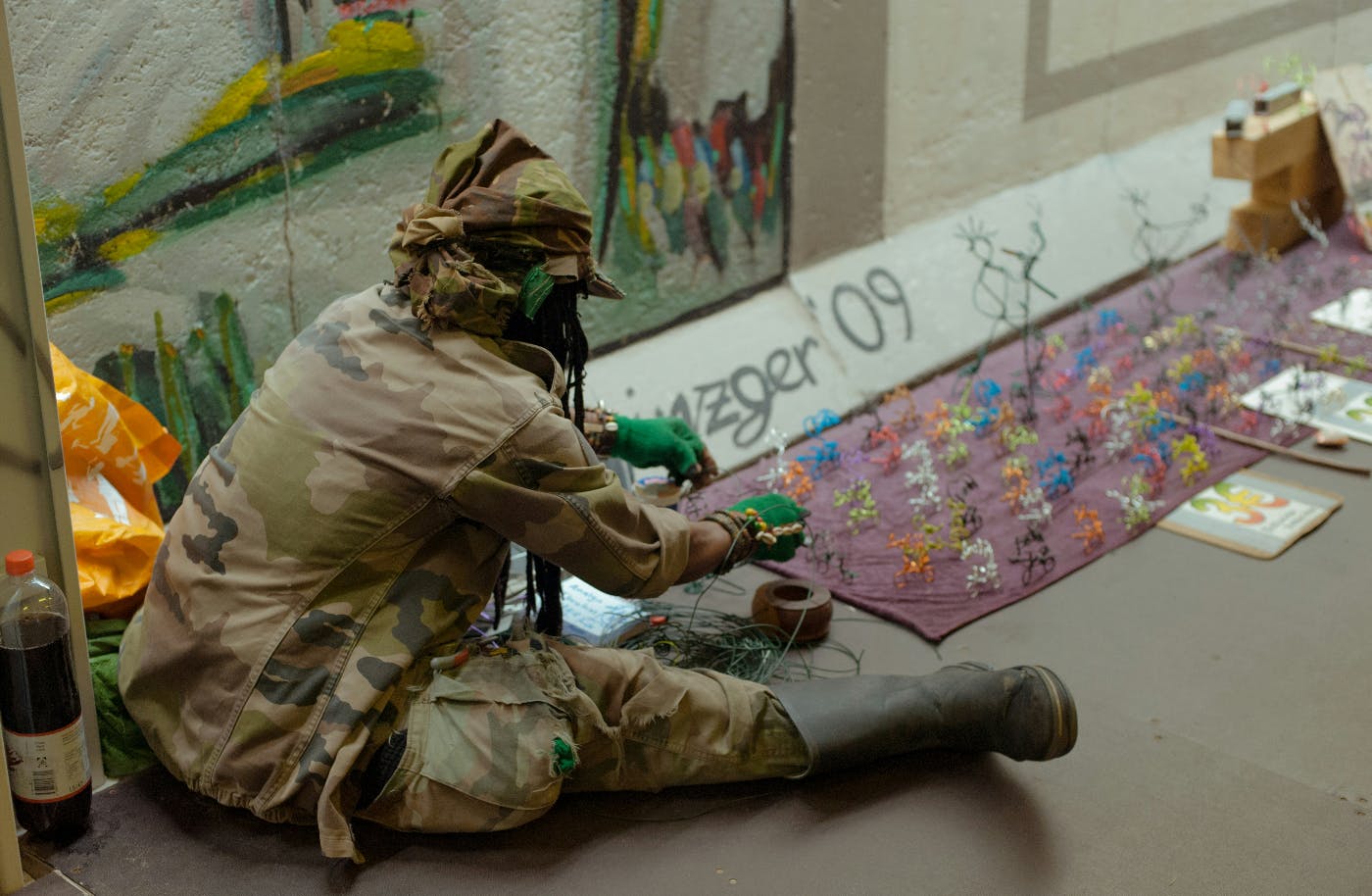
An avalanche of curated perfection surrounds today’s world. Social media platforms amplify this phenomenon, providing endless feeds with images of flawless vacations, picture-perfect families, meticulously plated meals, and professional successes.
The Chaos Tattoo
After I got my first equity card—the ultimate proof that I was now a professional actor and a proud member of the Actor’s Equity Association—I decided to mark the occasion in a meaningful way. For me, that meant getting a tattoo.
I had been planning this tattoo for a while. I’d searched for the right artist, wandered through tattoo shops, and contemplated the perfect design. The day finally came: I walked into the shop, design in hand, ready to make it official.
My design was simple yet profound: the kanji for chaos. Not chaos as in the bumbling bad guys from Get Smart, but chaos in its Eastern philosophical sense. It represents the idea that "before the beginning of great brilliance, there must be chaos. Before a brilliant person begins something great, they must look foolish in the crowd."
Why did this resonate with me so profoundly? Because it encapsulates the life of an actor—and, by extension, anyone who pursues a life of creation and connection. To be an artist is to be vulnerable, to risk failure, and to embrace imperfection. Chaos reminds me to carry that ethos in my work and my life. It’s a permanent emblem etched onto my skin, a reminder that imperfection isn’t just part of the process—it is the process.
This philosophy has taught me that imperfection is not a weakness; it’s a strength. And it’s not just artists who can learn from this idea. All of us, in our relationships, our work, and even our personal brands, can build deeper connections by embracing our flaws and imperfections.
The Pressure to Appear Perfect
An avalanche of curated perfection surrounds today’s world. Social media platforms amplify this phenomenon, providing endless feeds with images of flawless vacations, picture-perfect families, meticulously plated meals, and professional successes. Often filtered and carefully chosen, these snapshots create an illusion of seamless, trouble-free lives. The reality is much more complicated, but the constant exposure to these idealized portrayals can lead to an overwhelming sense of inadequacy for anyone consuming them.
The cultural message is clear: to be valued, respected, or admired, you must appear to have it all together. This pressure is pervasive and affects people from all walks of life. It pushes us to create personal brands rather than authentic lives, prioritizing what is presentable over what is real.
For actors, this expectation is particularly heavy. The profession itself is built on the idea of performance—of stepping into roles, perfecting them, and delivering a polished product for audiences. On top of this, the entertainment industry is notoriously image-conscious, with its fixation on appearance, age, and perceived perfection.
Yet the irony of acting, and indeed of life, is that true connection comes not from the veneer of perfection but from vulnerability. The most powerful performances often emerge from moments of raw honesty—the stammer in a voice, the tear that comes unbidden, the crack in the façade that reveals something deeply human. These are the moments that stick with us because they feel real.
This paradox extends far beyond the stage or screen. It’s universal. Think of the pressure students face to present perfect grades, workers to deliver flawless results, or parents to showcase well-behaved children. Social media amplifies this tendency by encouraging us to edit our lives to fit a specific narrative. We crop out the messy parts, apply filters to smooth over imperfections, and construct a version of ourselves that feels more acceptable.
But this constant striving for perfection comes at a cost. It can erode our sense of self-worth, disconnecting us from who we truly are. When we focus solely on projecting an idealized version of ourselves, we lose touch with the messy, flawed, and beautiful humanity that makes us unique.
It also takes a toll on our relationships. Authentic connections are built on trust and honesty, but perfectionism often gets in the way. When we hide our struggles, insecurities, or mistakes, we create distance. Our relationships become transactional rather than transformative, as they revolve around maintaining appearances rather than sharing truths.
Perhaps the most insidious consequence of the pressure to appear perfect is that it stifles creativity. Creativity thrives in imperfection—it’s born in the messy spaces where ideas collide, risks are taken, and failures happen. When we are consumed with appearing flawless, we’re less likely to take those risks. We avoid stepping outside of our comfort zones because the possibility of looking foolish feels too great a price to pay.
The societal demand for perfection may seem overwhelming, but it’s also unsustainable. The cracks are beginning to show. In recent years, there has been a growing recognition of the value of vulnerability and authenticity. Movements like the rise of unfiltered social media content, mental health advocacy, and the embrace of "realness" in art and culture point to a shift in priorities. People are starting to push back against the pressure to project perfection and are instead seeking ways to celebrate their humanity.
In the end, the polished persona may win admiration, but it’s the messy, flawed, and vulnerable moments that win hearts. Letting go of the pressure to appear perfect is not just liberating—it’s the first step toward building genuine connections with ourselves and others.

The Relatability Factor
Why are we so drawn to imperfection? The answer lies in relatability.
When we encounter someone’s flaws—whether it’s a self-deprecating joke, a candid admission of failure, or an unpolished moment—we see a reflection of ourselves. These glimpses of imperfection remind us that we’re not alone in our struggles, insecurities, or shortcomings. They provide reassurance that it’s okay to be human in a world that often seems to demand otherwise.
Think about the last time a friend confided in you about a mistake or shared an embarrassing story. Did it make you think less of them? Likely not. In fact, it probably strengthened your bond. Moments like these foster intimacy because they invite us into someone else’s world in an unguarded way. They say, “I trust you enough to show you my real self.”
This is the power of vulnerability. It breaks down barriers and builds bridges. Whether it’s a friend’s confession, an actor baring their soul on stage, or a brand owning up to a misstep, these moments resonate with us because they’re authentic. They remind us that perfection isn’t what connects us—imperfection is.
Psychologists have studied this phenomenon, and the findings are fascinating. The “Pratfall Effect” demonstrates that people become more likable when they make small mistakes or reveal their flaws. For instance, a confident speaker who fumbles with a microphone or spills a drink might actually endear themselves to the audience more than if they delivered a perfect, error-free presentation. Why? Because these little moments of imperfection make them seem approachable and human.
On the other hand, perfection can feel cold and unattainable. While we may admire someone who appears flawless, it’s hard to connect with them on an emotional level. They seem distant, otherworldly, and perhaps even intimidating. Their perfection highlights our own perceived inadequacies rather than creating a sense of camaraderie.
This principle extends beyond personal interactions to cultural touchstones and storytelling. Consider the enduring popularity of underdog stories in movies, books, and TV. Audiences root for characters who stumble, struggle, and fight their way toward success because their imperfections make them relatable. Perfect heroes might be admirable, but flawed heroes are beloved.
Even brands and public figures have started to lean into this idea. Think of brands that highlight their sustainability journey by admitting they aren’t perfect yet but are striving to do better. Or public figures who share their mental health challenges, breaking away from the polished celebrity image to reveal their humanity. These acts of vulnerability resonate because they reflect the messy, imperfect reality we all live in.
In a world saturated with polished perfection, imperfections are like a breath of fresh air. They remind us that we’re all in this together, navigating the complexities of life as best we can. And in that shared recognition of imperfection, we find connection, trust, and, ultimately, belonging.
The Authenticity Advantage
In a world increasingly dominated by polished façades and manufactured personas, the demand for authenticity has become more than just a trend—it’s a cultural shift. People are tired of being sold an illusion. They’re longing for something real: real connections, real stories, and real people.
This hunger for authenticity has reshaped how we interact with everything, from relationships to entertainment to marketing. People are more discerning than ever. They can spot inauthenticity a mile away and are quick to call it out. This is why authenticity is no longer optional—it’s essential for building trust and loyalty.
Take, for example, the Dove “Real Beauty” campaign. When it launched, it was groundbreaking. At a time when the beauty industry was dominated by airbrushed perfection, Dove chose to feature women of all shapes, sizes, and ages. The campaign wasn’t just visually striking—it was emotionally resonant. It spoke to an audience that had grown weary of unattainable beauty standards and celebrated diversity in a way that felt genuine. The result? A wave of goodwill, brand loyalty, and cultural impact went far beyond traditional advertising metrics.
Now, contrast this with brands or public figures who cling to perfection. When these figures inevitably stumble—and everyone does—the backlash is often swift and severe. Why? Their perfection was a carefully crafted illusion, and when that illusion is shattered, it feels like a betrayal. The audience isn’t upset about the mistake itself—they’re upset that they were led to believe the mistake couldn’t happen.
Authenticity, on the other hand, operates on a completely different level. When you’re upfront about your flaws, your audience isn’t shocked when they see them. In fact, they’re more likely to forgive your missteps and celebrate your successes because they feel invested in your journey. Authenticity builds trust because it’s rooted in honesty. It acknowledges imperfection as a shared human experience rather than something to hide.
This isn’t just about marketing—it’s about human connection. Think of the celebrities who openly discuss their struggles with mental health, addiction, or personal setbacks. Instead of tarnishing their image, these admissions often endear them to their fans. Why? Because they show that even the seemingly untouchable are just as human as the rest of us.
This principle applies to brands, too. Consider Patagonia, which doesn’t shy away from acknowledging the challenges it faces in its sustainability efforts. By admitting it’s a work in progress, the brand creates a sense of transparency and relatability. Customers trust Patagonia not because it’s perfect but because it’s honest about its imperfections and committed to improvement.
There’s a lesson here: people don’t expect perfection. They expect sincerity. When you embrace authenticity, you’re not just building a following or selling a product but creating a relationship. And in a world full of noise, those relationships are what truly stand out.
The authenticity advantage is this: while perfection may impress, authenticity inspires. It invites people to connect with you on a deeper level, root for you, and see themselves in your story. Whether you’re a person, a brand, or an artist, em

The Psychology Behind It
Why does imperfection resonate so deeply? The answer lies in the very fabric of human nature.
On an evolutionary level, humans are wired to seek connection and community. Survival in ancient times depended on forming strong bonds with others—whether for protection, cooperation, or emotional support. To connect deeply, we needed to understand and empathize with one another, which required a willingness to share vulnerabilities. Perfection, by its very nature, creates distance. It sets someone apart as “other,” an ideal that feels unattainable and unrelatable. Imperfection, on the other hand, invites us in. It signals, “I’m just like you.”
The Pratfall Effect is a fascinating psychological phenomenon that illustrates this principle. Studies show that people who exhibit minor, harmless flaws—spilling coffee, forgetting a line—are often perceived as more likable than those who appear flawless. The reasoning is simple: perfection can be intimidating, even alienating, while imperfection humanizes us. When someone reveals a flaw, it feels like they’ve lowered their guard, inviting us to lower ours in return.
Empathy plays a key role here. When someone shares their struggles, insecurities, or missteps, it triggers our capacity for empathy—a fundamental human trait. Seeing another person’s vulnerability reminds us of our own and fosters a sense of shared experience. We see their humanity, and it reflects our own. This connection, forged through imperfection, strengthens relationships and builds trust.
Beyond the psychological, there’s also a profound, almost spiritual element to embracing imperfection. In Japanese aesthetics, the concept of wabi-sabi celebrates the beauty of imperfection, impermanence, and incompleteness. A cracked teacup or a weathered piece of wood isn’t seen as flawed but as uniquely beautiful. These imperfections are marks of life and history; they tell a story that perfection simply cannot.
This philosophy extends to human imperfection. Our scars—whether physical, emotional, or metaphorical—are markers of our journey. They show where we’ve been, what we’ve overcome, and who we are. In this sense, imperfection isn’t just relatable; it’s deeply meaningful. It tells the stories that make us unique, memorable, and ultimately human.
Culturally, celebrating imperfection often challenges dominant ideals. In a world obsessed with airbrushed perfection and unattainable standards, embracing flaws is a form of rebellion. It’s a way of saying, “I am enough, just as I am.” This message is powerful because it’s liberating—not just for the individual expressing it but for everyone who resonates with it.
Imperfection also fosters creativity. Life's cracks, mistakes, and messiness often lead to unexpected discoveries and innovations. Perfection leaves no room for growth or exploration, but imperfection invites us to adapt, rethink, and innovate. Some of the most groundbreaking ideas and art forms have emerged from the willingness to embrace flaws and see potential in what others might dismiss as broken.
In essence, imperfection resonates so deeply because it aligns with our core human experiences: to struggle, to grow, and to connect. It reminds us that we’re not alone in our journey and that, in fact, the very things we see as flaws might just be the marks of our greatest strengths. When we embrace imperfection, we’re not just accepting ourselves—we’re celebrating the richness and complexity of being human.
Embracing Imperfection
So, how do we embrace imperfection in a world obsessed with perfection? Here are some practical steps:
For Individuals:
Share Your Stories: Be open about your challenges and failures. It’s not about airing every detail of your life but about being honest where it matters.
Reframe Your Flaws: Instead of seeing your imperfections as weaknesses, view them as opportunities for growth and connection.
Practice Self-Compassion: Treat yourself with the same kindness you would offer a friend.
For Brands:
Be Transparent: When things go wrong, own up to it. People appreciate honesty far more than spin.
Celebrate Real People: Showcase the diversity of your audience and their authentic stories.
Focus on Relationships Over Transactions: Build genuine connections with your audience by showing that you value them as people, not just customers.
Summing Up
Reflecting on my chaos tattoo, I’m reminded of its deeper meaning. Chaos is not the enemy of greatness—it’s the precursor to it. We find true brilliance in the messiness of life, the vulnerability of risking failure, and the courage to be imperfect.
Whether you’re an artist, a brand, or simply someone trying to navigate this imperfect world, remember this: It’s not your perfection that will connect you to others. It’s your humanity.
So embrace the chaos. Celebrate the flaws. And trust that in your imperfection lies your greatest strength.

